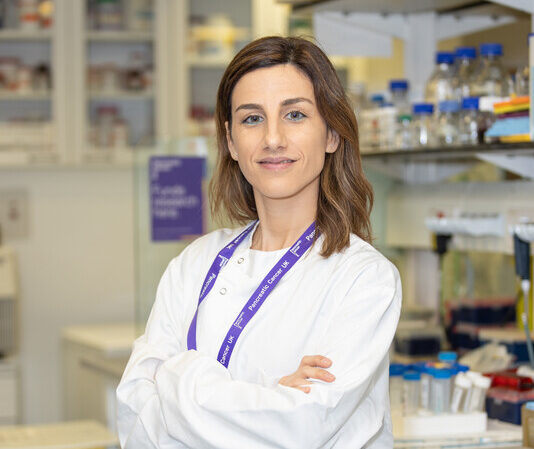Researcher: Dr Pilar Acedo
Location: University College London
Date: April 2023
Project status: Ongoing
Investigating blood proteins and microorganisms to detect pancreatic cancer earlier
The challenge
Early detection of pancreatic cancer is key to improve survival rates. 91% of patients visit their GP with non-specific but concerning symptoms in the years leading up to their diagnosis, which provides a window of opportunity to detect pancreatic cancer earlier and save lives. However, at present there is no way to accurately identify those who are at high risk of pancreatic cancer, and those who are affected by other non-life-threatening conditions.
The project
This project will use cutting-edge techniques to investigate proteins released into the blood by pancreatic cancer cells. Dr Acedo will study promising biomarkers of pancreatic cancer that have been identified in previous studies, and also add in new proteins involved in inflammation which have never been studied in these samples before. She is interested in these proteins because development of pancreatic cancer is closely related with prolonged inflammation of the pancreas and problems with regulating the immune response.
In addition to protein biomarkers, Dr Acedo will also investigate the different types of microorganisms, such as bacteria, found in the pancreas. Microorganisms are found in a healthy pancreas, but previous studies have shown that changes to the number and types of microorganisms may be linked to an increased risk of pancreatic cancer. For example, some types of microorganisms may cause inflammation which ultimately leads to tumour development. Dr Acedo will investigate whether clues about the types of microorganisms present in the pancreas can be found in blood samples.
The hope
Dr Acedo hopes that by studying both proteins and microorganisms present in the pancreas, she will be able to find a set of biomarkers that are very specific to pancreatic cancer and are able to accurately distinguish it from other diseases of the pancreas.
Developing new and more accurate tests for pancreatic cancer will mean that people who are likely to have pancreatic cancer can be quickly and urgently referred for further tests. This project will also increase our knowledge of the processes involved in the development and progression of pancreatic cancer, including the relationship between the immune system, the microbiome and the tumour, which may lead to better treatments for this devastating disease.
A few years ago, we knew a little bit about early detection of pancreatic cancer, but finally people are realising how important it is. The future is really exciting.
Meet the researcher
Dr Pilar Acedo



